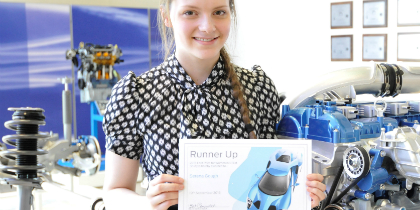
October 10, 2016, by Emma Lowry
Nottingham civil engineering student wins finalist place in Ford Women in STEM competition
A University of Nottingham civil engineering undergraduate was one of just three finalists in the UK-wide Ford Prize for Women in STEM Study Competition, which recognises the achievements of women working in Science, Technology, Engineering and Mathematics, which are traditionally male-dominated fields.
Serena Gough, 19, a second-year student at Nottingham, who was announced one of only two runner up in the competition, was among the select group of finalists invited to attend an assessment day at Ford’s Dunton Technical Centre, Essex. On the assessment day, each finalists attended a short interview with a panel of judges, followed by an opportunity to tour of some of the test facilities on site and to meet with female engineers at different stages in their career working for Ford. Last year’s STEM Prize winner, Melissa Matthews, from St Georges University also shared some words of wisdom with the three finalists.
Below we hear from Serena on her Ford Prize experience and what drives her to be an engineer.
Why were you shortlisted in the competition?
It was suggested that I enter the competition by Heidi Freestone who is the Business and School Engagement Coordinator at the University of Nottingham. Heidi Freestone organises the STEM Outreach programme for which I am an ambassador. She kindly supported my application which I completed myself. I was shortlisted for my involvement in encouraging young people, especially young girls, to consider taking the subjects necessary to pursue a STEM-related career, both before and during my time at university.
What was it like to tour the test facilities at the Dunton site?
I felt both privileged to have the opportunity to view the testing facilities where they can simulate temperature, humidity and wind conditions for all new cars. I found it fascinating to view the immense mechanics behind their largest wind tunnel. I also got to see the crash test dummies in action.
What did you learn from the Ford female engineers and Melissa Matthews?
I learned that they have all come from different backgrounds and countries. Melissa has attended many events representing Ford where she has learned more about the industry. One of the judging panel was Claire Flannery, the Campaign Operations Director, for the Your Life campaign, which encourages girls to study maths and physics at school.
What drew you to study STEM subjects?
I have always enjoyed STEM subjects which involve logic and reasoning and eventually came to understand the numerous and diverse career opportunities to which they could lead. I always knew that I wanted to study Engineering and this desire increases the more I learn.
What have been the most positive aspects of studying civil engineering?
I enjoy learning the reasoning behind the world around me, for example how forces work and the mechanics of buildings.
What words of encouragement would you give other prospective female students contemplating STEM subjects at university?
Do not be afraid to study a subject that is typically seen as ‘male-orientated’. You may be able to do it better!
What are you hoping to do after leaving university?
I hope to gain chartered status and be part of a team which designs world-renowned iconic structures which benefits many people.
No comments yet, fill out a comment to be the first

Leave a Reply